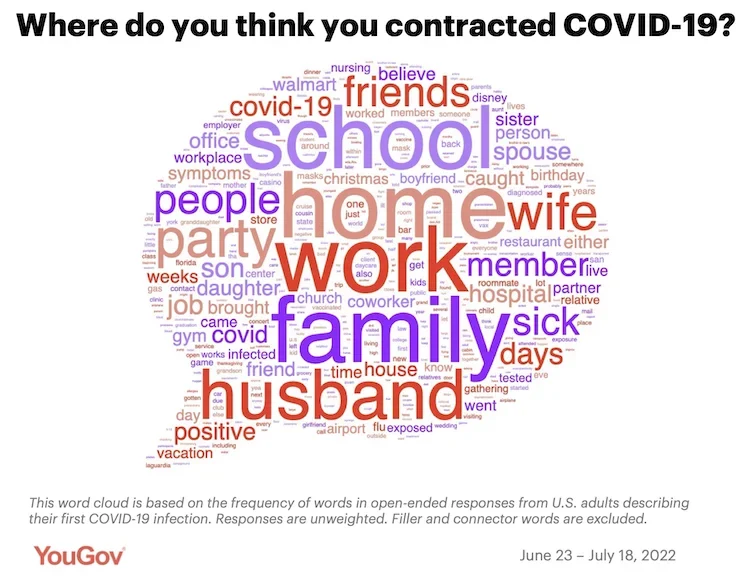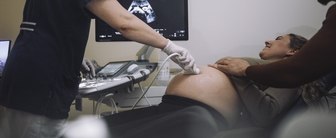In a series of recent surveys, YouGov asked Americans who’ve been infected with COVID-19 to tell us about their first experience with the virus. While less than one in five Americans describe their infection as severe, 44% of people say their infection lasted a week or more, and about one in three say their symptoms lingered, resulting in long COVID.
While we can learn a lot by surveying Americans about a disease that most of them have had, this approach can only tell us about the experience of people who think they've had COVID. Many who have had it don't know they have. Studies examining the presence of COVID-19 antibodies suggest that many Americans who’ve had COVID-19 are not aware that they’ve been infected. While our poll suggests that around one-third of American adults believe they’ve had the disease, the Institute of Health Metrics and Evaluation estimates that 82% of Americans may have had COVID-19 at some point.
Testing positive
How many Americans believe they’ve contracted COVID-19? The answer depends on how you ask the question. Since the start of the pandemic, polls by the Economist/YouGov have on a near-weekly basis asked Americans whether they personally know anyone who has tested positive for COVID-19. In the latest poll, conducted July 16-19, 27% of Americans responded “yes, me.” Since the start of 2022, the same poll has asked people whether or not they think they’ve had the virus, regardless of whether they’ve had a positive test. On this question, the same share – 27% – say they’ve definitely had it, while an additional 16% say they’ve probably had it.
Our latest survey takes an approach that falls somewhere in the middle, asking whether or not a person has ever had COVID-19, without specifically mentioning a positive test result. Using this version of the question, we find that one-third of Americans (33%) say they’ve had COVID-19, while 60% say they haven’t, and 7% are unsure. Adults who are under 65 are more likely to report an infection than are those who are 65 and older. Compared to white Americans (32% of whom say they’ve had COVID-19), Hispanic Americans are slightly more likely to report an infection (43% say they have), while Black Americans are slightly less likely to (27%). Republicans (38%) are more likely than Democrats (30%) or Independents (33%) to say they’ve had COVID-19.
When asked how many times they’ve had the virus, 8% of Americans say they’ve been infected more than once, including 6% who say they’ve had COVID-19 exactly twice and 2% who say they’ve had it three or more times. People who say they’ve been infected more than once are more likely than those who say they’ve only been infected once to say their first infection occurred prior to 2022.
When asked which testing method they used to determine they had the virus the first time they were infected, a roughly equal share say they used a rapid antigen test (30%) as say they used a PCR test (28%). Fewer – 16% – say they used both, and 27% say they used neither form of test. The later in the pandemic a person says they were infected, the more likely they are to have tested positive using a rapid antigen test: 68% of people who say they had COVID for the first time in 2022 say they used a rapid test, compared to 43% of those who say they first had it in 2021 and 16% who said they first got COVID before 2021.
Contracting and spreading the disease
Do Americans who say they’ve had COVID think they know where and from whom they got it? More than half of people who say they’ve been infected (57%) say they have a good guess as to where they contracted COVID-19 the first time they were infected. The more recently people say they contracted the disease, the more likely they are to report an awareness of where they became infected.
We asked people who said they had a good idea where they were infected to tell us where they think it happened, in their own words. The word cloud below shows the relative frequency of words used in open-end responses to this question. Some of the most common responses include work, family, home, school, party, husband, and wife.

Fewer Americans – 40% – say they know who they contracted the virus from. As with the prior question, people who say they were infected for the first time more recently are more likely to report knowing whom they got it from.
Americans are less aware of whether or not they spread the virus to anyone else. Nearly one in four (23%) believe they infected another person, while half (52%) say they did not and one in four (25%) are unsure. Among people who say they spread it to someone else, 78% say they spread it to someone inside their household, while 23% say they spread it to someone outside their household. The year a person says they were first infected does not seem to play a large role in whether they believe they spread the virus.
Severity of infection
Most Americans describe their first COVID-19 infection as mild (39%) or moderate (44%). The rest – 17% – describe it as severe. People who say they first had the virus earlier in the pandemic are far more likely to say their infections were severe compared to people infected later in the pandemic: 30% of those who say they first caught it prior to 2021 say their infection was severe, compared to 16% of people who say they caught it in 2021, and 8% of people who say they caught it in 2022. People who say they’ve had COVID-19 more than once tend to describe their second and third infections as less severe than their first.
About one in 10 Americans (11%) who say they’ve had COVID say they were hospitalized as a result of their first infection. Among people who say they were infected prior to 2021, 18% report having been hospitalized as a result, compared to half as many (9%) infected in 2021 or later.
Lower severity for later infections could reflect the effects of vaccines and improved treatments, though there is also evidence that the virus itself changed to cause less severe disease.
Symptoms
The vast majority of people who say they’ve had COVID (84%) report experiencing symptoms during their first infection, while 16% say they were asymptomatic. While people who say they were infected earlier in the pandemic report greater severity of infection, year of infection does not appear linked to the likelihood of a person having any symptoms (86% in 2021 or later vs. 85% prior to 2021). (People with asymptomatic COVID are far less likely to know they had it, and therefore are likely to be underrepresented among people with COVID experiences in our survey.)
The most common symptoms reported among people who say they’ve had the virus include:
- Fatigue (reported by 61%)
- Cough (53%)
- Muscle or body aches (51%)
- Fever or chills (48%)
- Headache (46%)
- Congestion or runny nose (45%)
- Sore throat (35%)
- Loss of sense of taste (31%)
- Shortness of breath or difficulty breathing (30%)
- Loss of sense of smell (29%)
In terms of variation in the types of symptoms reported during different phases of the pandemic, a few stand out. People who say they were first infected earlier in the pandemic are more likely to report shortness of breath. People who say they were first infected prior to 2022 are also far more likely to report loss of taste and smell.
How long did symptoms tend to last? While 16% report experiencing no symptoms during their first infection, one in five Americans (21%) say their symptoms lasted more than 10 days. The rest fall somewhere in the middle, with 20% saying their symptoms lasted one to four days, 17% saying they lasted five to six days, and 23% saying they lasted seven to 10 days.
Long COVID
Our survey also asked about experiences with “long COVID,” which includes a range of symptoms that last weeks or months after first being infected. Three in 10 Americans (30%) say they consider themselves to have had long COVID, including 13% who say they currently have it and 17% who say they had it but no longer do. More than half of people who say their infection was severe (56%) report experiencing long COVID, including 25% who say they still have long COVID.
While people who report less severe infections are less likely to report experiencing long COVID, there is still a sizable share who do, including 34% of people with a moderate first infection and 13% of people with a mild first infection. Even 18% of people who say they didn’t experience any symptoms during their first infection report lingering post-infection symptoms.
Treatment
Which medications have Americans used to treat their COVID-19 infections? A little more than half (55%) of people say they took some type of nonprescription medication to treat their first COVID-19 infection. In an open-end question about which over-the-counter medications people with COVID took, the most common responses included ibuprofen, acetaminophen (such as Tylenol), cough syrup, and vitamins. People first infected later in the pandemic are more likely to have taken nonprescription medication compared to people infected at earlier points.
About one in four people (24%) say they used prescription medication to treat their first infection COVID-19 infection. Among the most common types mentioned were antibiotics, steroids, inhalers, monoclonal antibodies, and Paxlovid (nirmatrelvir and ritonavir).
Roughly half of people (53%) who report having COVID-19 say they were unvaccinated the first time they became infected. Fewer – 41% – say they were fully vaccinated, including 22% who say they’d received boosters. Around half of people (55%) who weren’t vaccinated when they contracted the virus for the first time say they still aren’t vaccinated, while 38% say they’ve now been fully vaccinated (including 21% who say they’ve been boosted).
Multiple infections
Three-fourths of Americans (75%) who say they’ve had COVID report having it only once, while 17% say they’ve had it twice, and 8% say they’ve had it three or more times. When asked how likely they think it is that they’ll become infected with COVID again in the future, Americans are divided: 38% say it’s very or somewhat likely they’ll be infected again, while 42% think it’s not very or not at all likely. About one in five (22%) are unsure. People who say they’ve had the virus more than once appear more aware of the risk of reinfection: 45% say it’s at least somewhat likely they’ll be reinfected, compared to 35% of people who say they’ve only had the virus only once.
People who say they’ve never had COVID-19
A growing body of research suggests that there may be some people who will never contract COVID-19, regardless of how much they’re exposed. In a poll conducted in April of this year, around half of Americans (52%) agreed with this idea, while 18% said they didn’t believe that certain people could never become infected. In our latest poll, only 6% of Americans who say they’ve never had the virus believe it’s “very likely” that they will eventually get it, while 27% say it’s somewhat likely. More say it’s not very likely (32%) or not at all likely (20%) that they’ll catch it someday.
When asked to consider a list of reasons why they haven’t yet had COVID-19, Americans who say they’ve never been infected provided mixed responses. Many people (57%) cite the precautions they’ve taken as a major reason they’ve avoided infection, and a similar share (53%) cite the vaccination they received. Only one in four (26%) say that their naturally strong immune system has been a major reason for their lack of infection, and fewer (17%) say it’s because the threat of COVID-19 has been exaggerated.
– Carl Bialik contributed to this article
The data presented in this article is aggregated from three surveys each of 1,000 U.S. adult citizens, which were conducted during the field dates of June 23 - 27, 2022, June 29 - July 4, 2022, and July 12 - 18, 2022. Explore more on the methodology and data for this poll.
Image: svetikd / Getty Images











